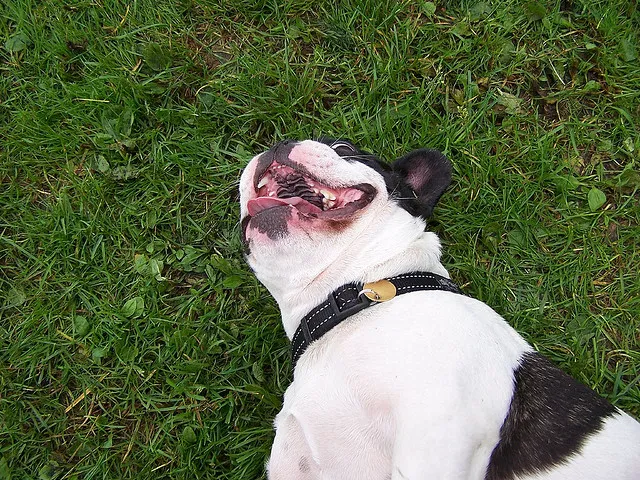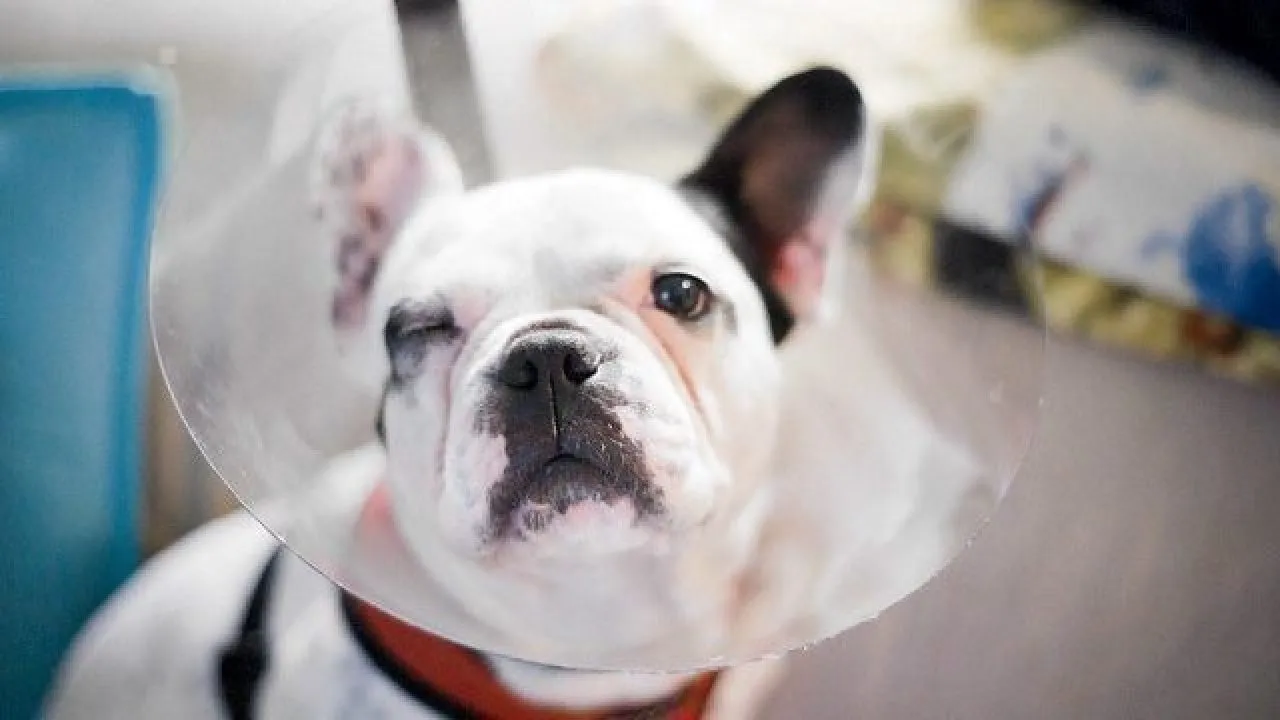Table of Contents
Key Takeaways
- The ever-popular French bulldogs have numerous health problems, especially those that come from puppy mills.
- Chronic allergies are common among French bulldogs.
- French bulldogs often suffer from cleft palates, which cause excessive sneezing or snorting.
- French bulldogs are prone to heatstroke, even when it’s not overly hot outside.
- Intervertebral disc disease is common in short-legged dog breeds, including Frenchies.
The Internet has been struck by Frenchie fever for the past few years, led by a wave of celebrity pets like Manny the Frenchie. French bulldogs were the fourth most popular dog breed in the United States in 2017, according to the American Kennel Club, up from #24 in 2009.
Most prospective pet parents are unaware that French bulldogs often face a long road of health problems, especially those pets from puppy mills. Some unscrupulous breeders sell “miniature” Frenchies, usually branded as teacup dogs, who are starved to stay small or just the runt of the litter.
Even the healthiest French bulldog will eventually face health issues, like all brachycephalic (short-faced) and dwarf dog breeds. In fact, 72% of the French bulldogs studied had at least one disorder, according to the Royal Veterinary College in London.
The 2018 study also found that male French bulldogs were more susceptible to health problems than females. Males were more likely to be diagnosed with eight of the 26 most common breed-associated conditions, whereas no issues were more common in females.
Frenchie pet parents should visit their veterinarian at least once per year – twice for senior dogs and puppies – and keep a close eye on your pet for any changes in behavior or appearance. With proper mindfulness of the breed’s needs, most Frenchies’ health conditions can be easily managed and pets can enjoy a long, happy life.
French Bulldog Allergies

A common ailment seen in Frenchies is chronic allergies. This breed has one of the highest genetic and environmental predispositions to developing canine atopic dermatitis (CAD), according to NomNomNow. One of the most challenging diseases to diagnose, allergies can be caused by food or environmental factors.
Although environmental allergies are more common in all dog breeds, any GI problems may point to food allergies or a combination of environmental and food allergies. Partnering with your veterinarian to do some investigating will help you discover the root cause.
Food allergies in French Bulldogs
Food allergies in dogs are often reactions to different types of meat. In some cases, food allergies can progress to more serious digestive medical conditions such as French bulldog IBD (Inflammatory Bowel Disease), according to vet4bulldog.com.
IBD in bulldogs can affect both their stomach and intestinal tracts. Inflammatory bowel disease is most commonly treated with special diet and anti-inflammatory/immunosuppressive agents. Some veterinarians are turning to fecal transplantation to help treat IBD.
Symptoms of a food allergy may include:
- Diarrhea
- Vomiting
- Abdominal pain
- Rumbling belly and flatulence
- Bloody stool
- Weight loss
- Lower than normal appetite
- Itchy skin
Food allergy occurs when a particular ingredient in their food causes the immune reaction. The following are the most common problem foods, in order:
- Beef
- Dairy products
- Wheat
- Chicken
- Egg
- Lamb
- Soy
- Corn
- Pork
- Fish
- Rice
If a food allergy is suspected, the only treatment is an elimination diet, where you feed your pet a prescription dog food that has either a novel protein source or a hydrolyzed protein source. After 8-10 weeks of feeding only the prescription food, and no other treats, you gradually reintroduce certain foods one at a time to see if symptoms return. If they do re-emerge, you can be highly confident your bulldog has a food allergy.
Many pet parents find homemade dog food and treats are the only way to ensure offending ingredients don’t find their way into a Frenchie’s diet.
Environmental Allergies in French Bulldogs
Sometimes the allergen is environmental or related to substances such as cleaning products, pollen, mold, grass, dust and bugs. Symptoms of environmental allergies in French Bulldogs include:
- Excessive itching
- Visible scaly or raw patches
- Constant licking, especially of the paws
- Sneezing
- Diarrhea or vomiting
- Watery eyes
- Recurrent ear infections
Diagnosing your dog’s condition can be tricky, as the first step towards treating allergies is identifying their cause. Many pets are allergic to multiple things, complicating the initial diagnosis. Generally, your veterinarian will use the elimination diet approach to rule out a food allergy first followed by intradermal skin testing.
Topical ointments, soothing shampoos, or even antibiotics may be prescribed to treat the painful, persistent symptoms of a pet’s allergies and prevent secondary skin infections.
Always use pet-friendly cleaning products in your home and store dangerous items like fertilizer and antifreeze out of paws’ reach.
Cleft Palate in French Bulldogs
An extremely flat face coupled with a propensity for genetic defects has made palate deformities all too common in French bulldogs. The palate refers to the roof of the mouth, which separates the mouth from the nasal passages. When the tissues between the mouth and sinuses do not develop fully, the result is a birth defect. A cleft palate is one of the most common types, especially in purebred pets and brachycephalic breeds. The deformity can affect a combination of the hard and soft palates as well as the lip.
Symptoms of cleft palate in French bulldogs depend on the location of the deformity. Cleft lips are immediately visible, with protruding teeth or gums; a nostril may be deformed as well. Secondary cleft palate, occurring inside the mouth, can be trickier to diagnose. French bulldogs with a cleft palate may show the following symptoms:
- Excessive sneezing or snorting
- Chronic runny nose
- Coughing when drinking water
- Difficulty eating
- Labored breathing after light activity
A pet parent of a French bulldog may take one look at these symptoms and shrug – many of these are typical Frenchie behaviors, after all. If you haven’t yet, ask your veterinarian to examine your pet’s palate. Diagnosing a soft palate defect may require anesthesia, as the examination is uncomfortable for dogs. Other medical conditions that affect breathing, like pneumonia or an upper respiratory infection, will be ruled out as well.

Cleft palate in French bulldogs requires surgery to correct, if the physical symptoms are severe enough. A minor cleft lip is primarily a cosmetic issue, but cases of secondary cleft palate in Frenchies often cause recurring respiratory infections.
Corrective surgery can be risky in younger pets, who are already malnourished and have issues breathing as a result of the defect. Pets with smaller clefts have a good prognosis; antibiotics, soft foods, and are typically prescribed an E-collar as part of post-operative care. Because it is a birth defect caused by genetics or possibly nutritional deficiencies, pet parents can’t prevent a cleft palate, only correct it with surgery.
French Bulldogs and Heatstroke
Small size and an adorably flat face make Frenchies extra susceptible to developing heatstroke, even in moderate temperatures. This condition is known as brachycephalic airway syndrome (BAS), the result of centuries of breeding that created short yet compact nasal bones, coupled with an extended soft palate that blocks airflow to the trachea. Best described as “inefficient,” brachycephalic dog breeds’ ability to stay cool needs a little human help. Some airlines even ban bulldogs in cargo holds because a few have died in transit.
“I’ve seen more than one Frenchie die in excessive temperatures — and one instance happened in only moderately warm weather when the AC in the house went out during a springtime electrical storm,” says Dr. Patty Khuly, VMD.

Humid weather and physical activity can exacerbate the effects of weather, causing a French bulldog to overheat easily. Signs of heatstroke in dogs include excessive panting and drooling, reddened gums, confusion, bloody vomit or diarrhea, and rapid heart rate. In severe cases, fainting, seizures, coma and death can result.
You may require emergency treatment for heatstroke in French bulldogs – call your vet, who will direct you in how to lower your pet’s body temperature safely while you are on the way to the veterinary ER. Your dog will require treatment or even hospitalization if suffering from heatstroke.
Prevent heatstroke in Frenchies by avoiding outdoor activity during peak temperatures, never leaving your dog in a car, or on the sidewalk. Pets who have experienced one episode of heatstroke are more likely to have another, so take extra precautions and always have water and some shade handy.
Intervertebral Disc Disease Diagnosis

Common throughout short-legged dog breeds, intervertebral disc disease (IVDD) affects the shock-absorbing discs between the vertebrates of the spine. As a dwarf breed, French bulldogs’ discs are more vulnerable than other breeds to age-related degeneration. IVDD can also occur as a result of traumatic or repetitive injury, like a fall, jumping off furniture or climbing up or down stairs.
Pets can have intervertebral disc disease without suffering from symptoms, but many eventually develop pain in the neck or back. Pain manifests differently in dogs than humans; it may take some detective work to figure out what exactly hurts. Reluctance or inability to lift or turn the head and loss of interest in food are common signs of neck pain in dogs.
Back pain may be signified by a reluctance to jump and vocalization or aggression when picked up. In severe cases of IVDD where the spinal cord is affected, neurological symptoms may arise – hunched body posture, odd walking gait, weakness, and even paralysis. If you notice any sudden changes in your dog’s gait or behavior, visit your vet immediately! Any physical movement can worsen an untreated case of intervertebral disc disease in French bulldogs.
Diagnosis of IVDD is most common between ages four and eight but dogs as young as two have shown symptoms. The vet may take an x-ray to visualize the spine, looking for the location of a calcified disc. Most of the time, however, an MRI or CT is recommended in lieu of x-ray for better visualization of the spinal cord and discs. Surgery is the only way to solve the problem of a slipped disc, but in some mild cases where surgery is not elected by the pet parent, strict bed rest and anti-inflammatory medications will be required for the body to attempt to heal itself. If palliative treatment doesn’t help the dog, if they have unrelenting pain or if the dog improves and then relapses, surgery may be needed.
Ear infections
Ear infections in French Bulldogs are common. There are three main types of canine ear infections: otitis externa (infection of the external ear), otitis media (infection of the middle ear), and otitis interna (infection of the inner ear).
Bacteria, yeast or allergies can cause ear infections. Ear infections can be uncomfortable and even painful for your dog. It’s important to seek veterinary care as soon as you see excess goop in the ear, redness in the ear, shaking of the head or pawing at the ear to prevent the infection from spreading into the middle and inner ear.
Cherry eye or conjunctivitis (pink eye)
Cherry eye is a common condition when a dog’s third eyelid (tear gland) moves out of its normal position and shows up in the corner of the eye as a pink or red swelling. Sometimes, the condition may just turn up periodically and then return to its normal position under the eyelid. Though it’s still not completely understood why dogs have this condition, weakness of the ligament to this gland is hereditary.
Treatment of cherry eye is a surgical procedure where your veterinarian will “tack” the third eyelid back in its normal position.
Pink eye or conjunctivitis is an inflammation of the tissue that covers the front part of the eyeball and lines the eyelids. Symptoms include squinting or blinking, redness in the eye, discharge and swelling. If it is a bacterial infection, your veterinarian will probably prescribe an antibiotic ointment. In some cases, you may need surgery to remove an obstruction in a duct.
The content is not intended to be a substitute for professional veterinarian advice, diagnosis, or treatment. Always seek the advice of your veterinarian or other qualified health provider with any questions you may have regarding a medical diagnosis, condition, or treatment options.









